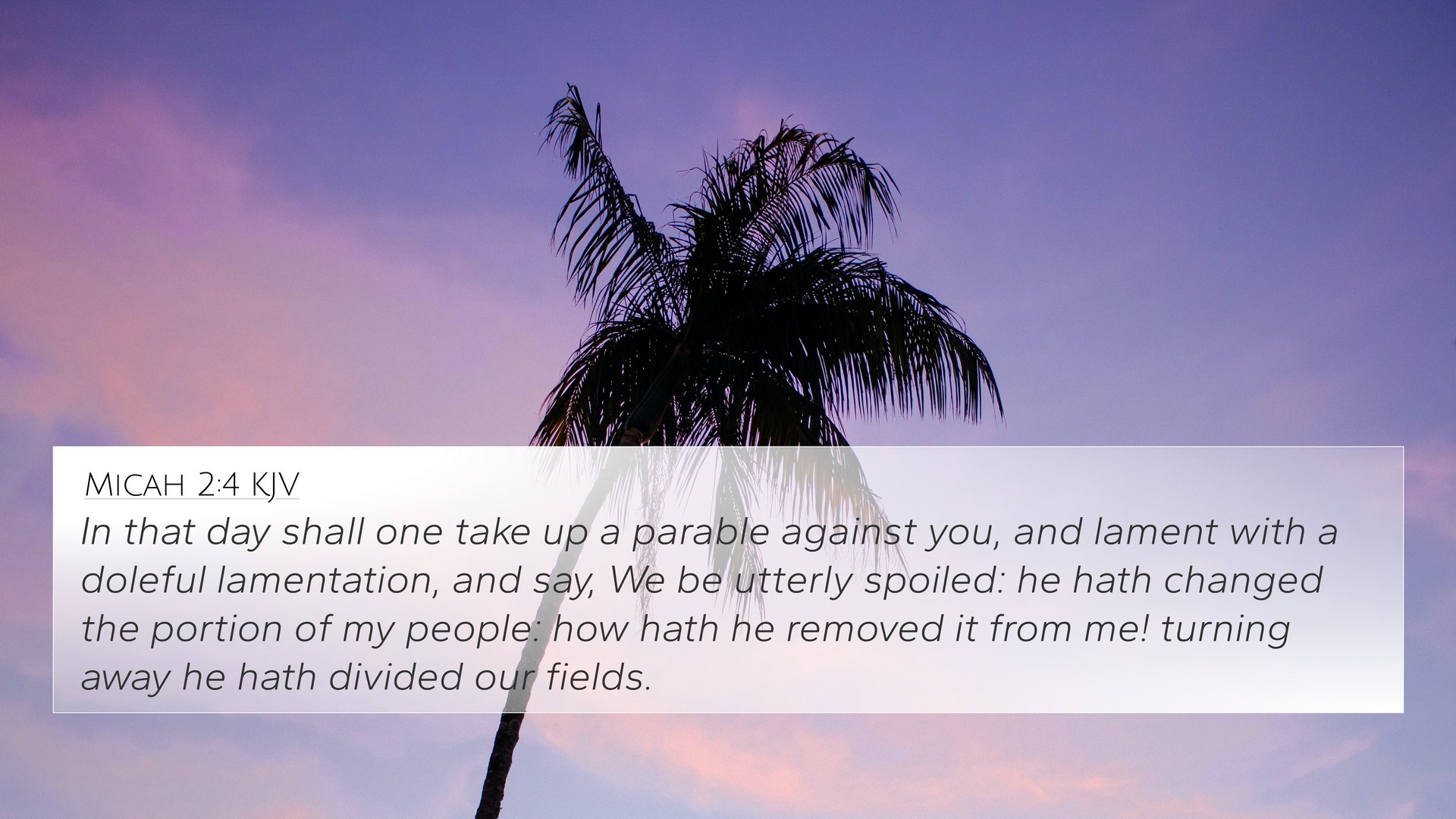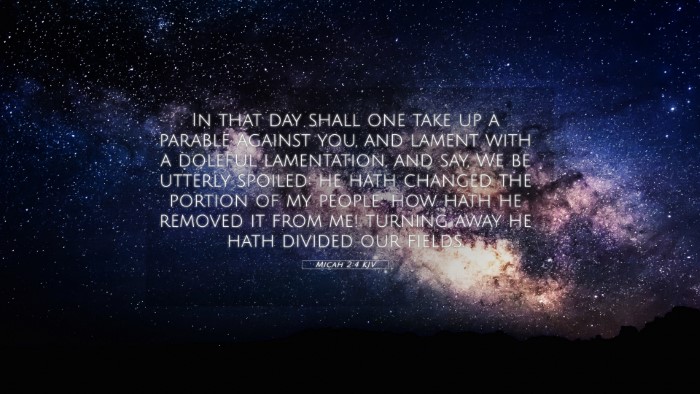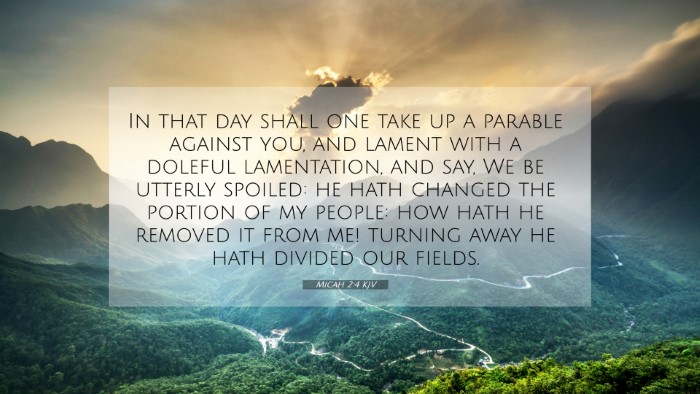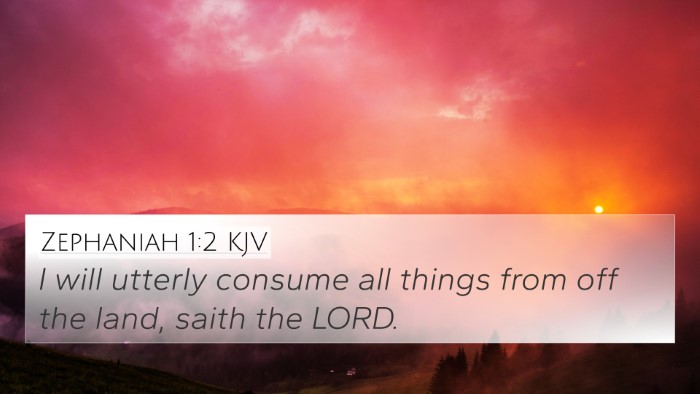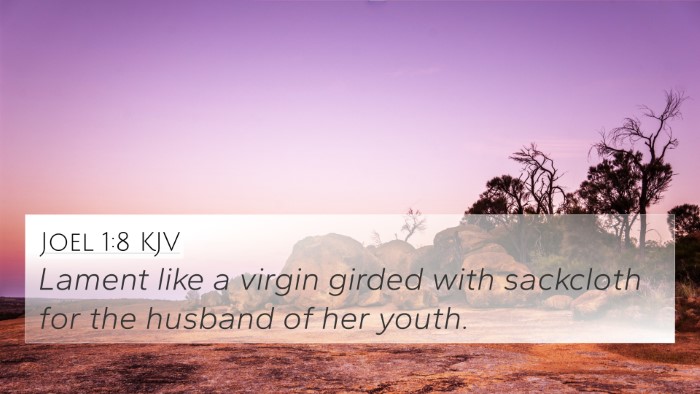Old Testament
Genesis Exodus Leviticus Numbers Deuteronomy Joshua Judges Ruth 1 Samuel 2 Samuel 1 Kings 2 Kings 1 Chronicles 2 Chronicles Ezra Nehemiah Esther Job Psalms Proverbs Ecclesiastes Song of Solomon Isaiah Jeremiah Lamentations Ezekiel Daniel Hosea Joel Amos Obadiah Jonah Micah Nahum Habakkuk Zephaniah Haggai Zechariah MalachiMicah 2:4 Similar Verses
Micah 2:4 Cross References
In that day shall one take up a parable against you, and lament with a doleful lamentation, and say, We be utterly spoiled: he hath changed the portion of my people: how hath he removed it from me! turning away he hath divided our fields.
Uncover the Rich Themes and Topics of This Bible Verse
Listed below are the Bible themes associated with Micah 2:4. We invite you to explore each theme to gain deeper insights into the Scriptures.
Micah 2:4 Cross Reference Verses
This section features a detailed cross-reference designed to enrich your understanding of the Scriptures. Below, you will find carefully selected verses that echo the themes and teachings related to Micah 2:4 KJV. Click on any image to explore detailed analyses of related Bible verses and uncover deeper theological insights.
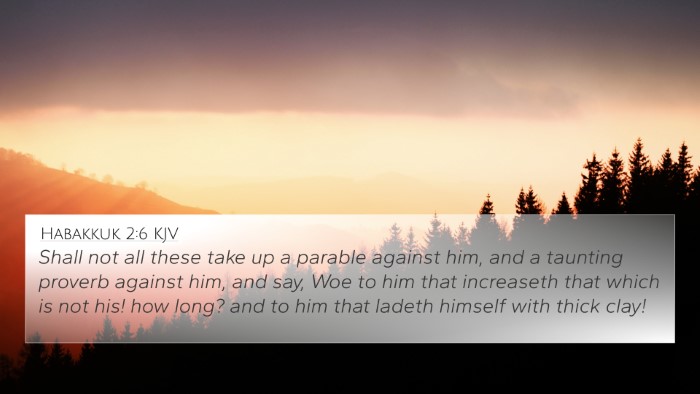
Habakkuk 2:6 (KJV) »
Shall not all these take up a parable against him, and a taunting proverb against him, and say, Woe to him that increaseth that which is not his! how long? and to him that ladeth himself with thick clay!

Jeremiah 9:17 (KJV) »
Thus saith the LORD of hosts, Consider ye, and call for the mourning women, that they may come; and send for cunning women, that they may come:
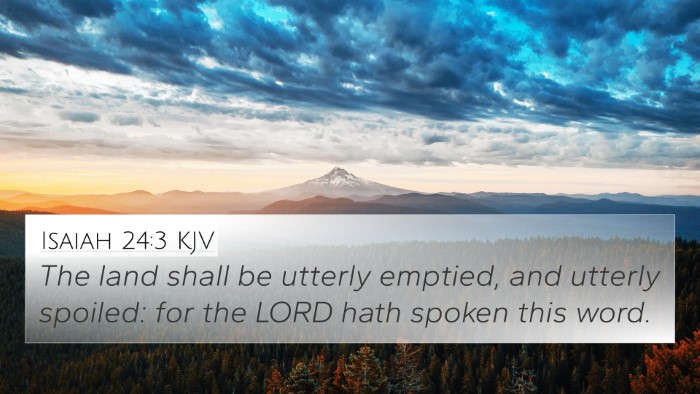
Isaiah 24:3 (KJV) »
The land shall be utterly emptied, and utterly spoiled: for the LORD hath spoken this word.
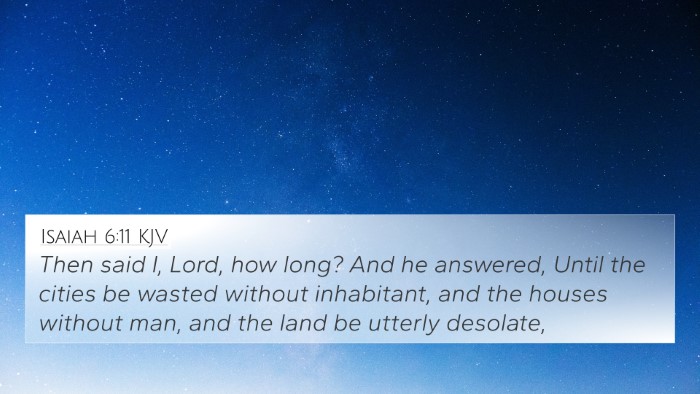
Isaiah 6:11 (KJV) »
Then said I, Lord, how long? And he answered, Until the cities be wasted without inhabitant, and the houses without man, and the land be utterly desolate,
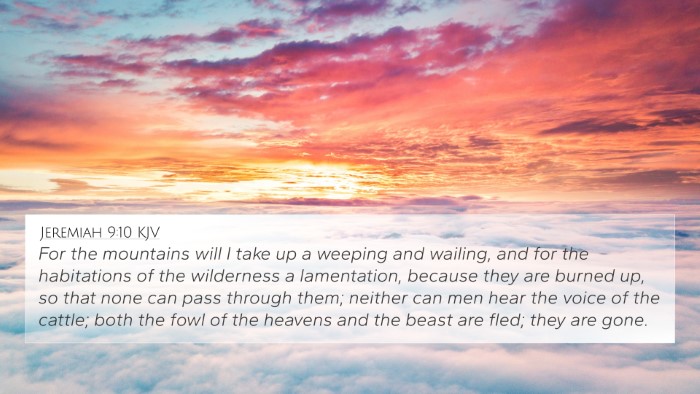
Jeremiah 9:10 (KJV) »
For the mountains will I take up a weeping and wailing, and for the habitations of the wilderness a lamentation, because they are burned up, so that none can pass through them; neither can men hear the voice of the cattle; both the fowl of the heavens and the beast are fled; they are gone.
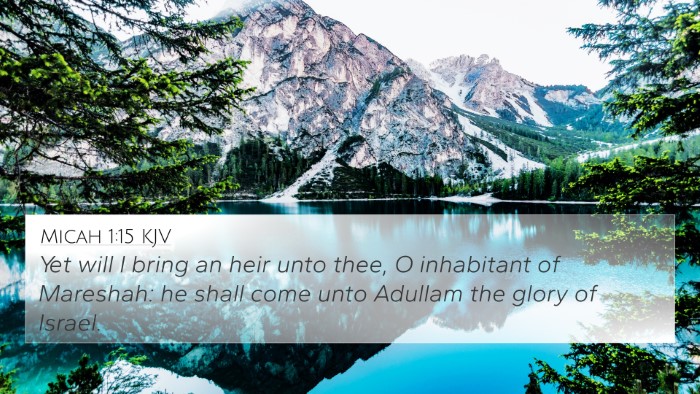
Micah 1:15 (KJV) »
Yet will I bring an heir unto thee, O inhabitant of Mareshah: he shall come unto Adullam the glory of Israel.
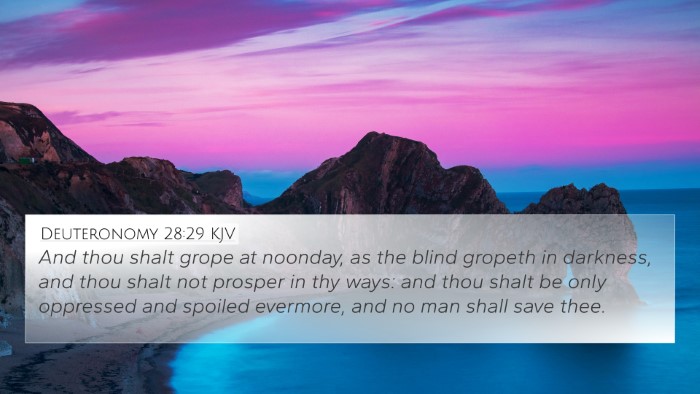
Deuteronomy 28:29 (KJV) »
And thou shalt grope at noonday, as the blind gropeth in darkness, and thou shalt not prosper in thy ways: and thou shalt be only oppressed and spoiled evermore, and no man shall save thee.

Numbers 23:7 (KJV) »
And he took up his parable, and said, Balak the king of Moab hath brought me from Aram, out of the mountains of the east, saying, Come, curse me Jacob, and come, defy Israel.

Micah 2:10 (KJV) »
Arise ye, and depart; for this is not your rest: because it is polluted, it shall destroy you, even with a sore destruction.
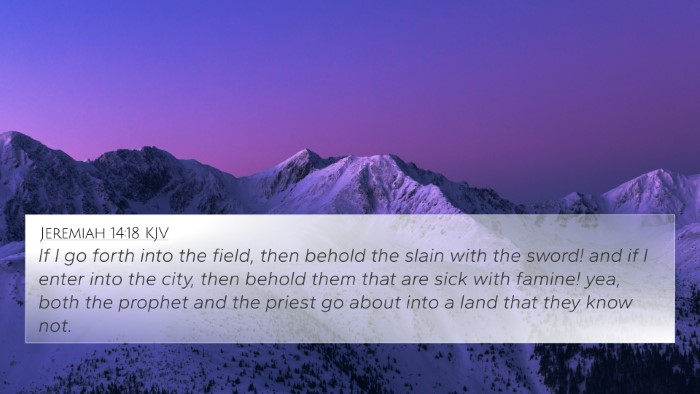
Jeremiah 14:18 (KJV) »
If I go forth into the field, then behold the slain with the sword! and if I enter into the city, then behold them that are sick with famine! yea, both the prophet and the priest go about into a land that they know not.
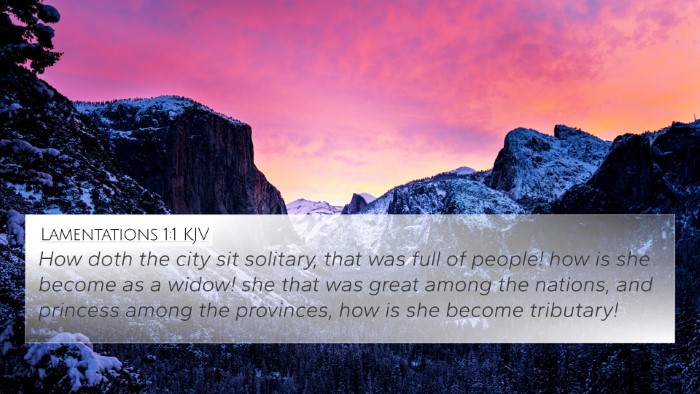
Lamentations 1:1 (KJV) »
How doth the city sit solitary, that was full of people! how is she become as a widow! she that was great among the nations, and princess among the provinces, how is she become tributary!
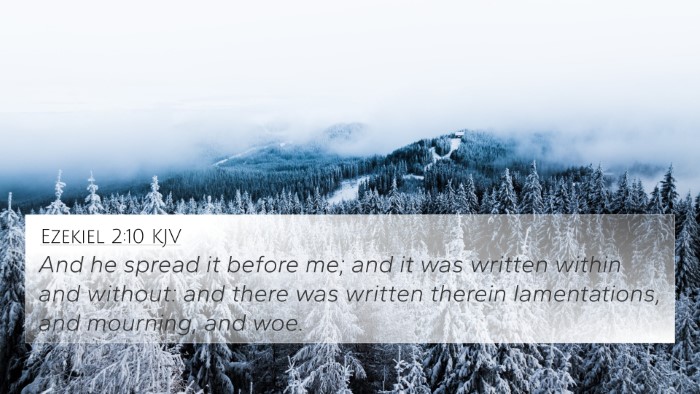
Ezekiel 2:10 (KJV) »
And he spread it before me; and it was written within and without: and there was written therein lamentations, and mourning, and woe.

Ezekiel 16:44 (KJV) »
Behold, every one that useth proverbs shall use this proverb against thee, saying, As is the mother, so is her daughter.
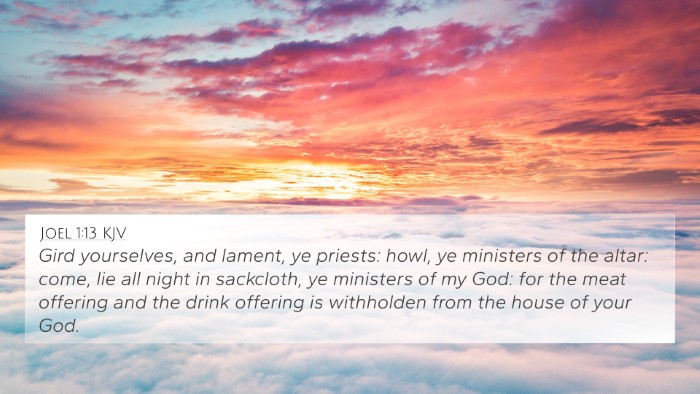
Joel 1:13 (KJV) »
Gird yourselves, and lament, ye priests: howl, ye ministers of the altar: come, lie all night in sackcloth, ye ministers of my God: for the meat offering and the drink offering is withholden from the house of your God.
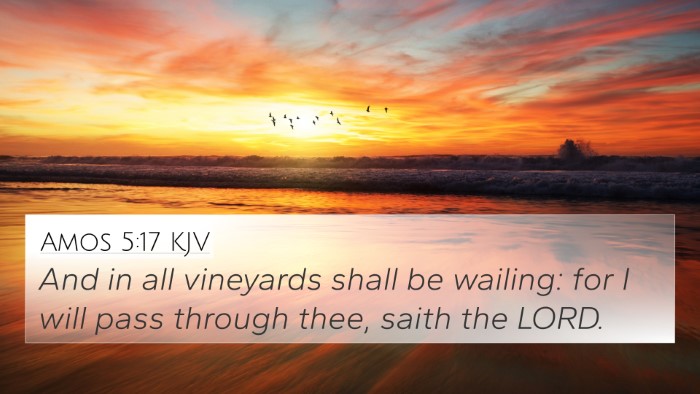
Amos 5:17 (KJV) »
And in all vineyards shall be wailing: for I will pass through thee, saith the LORD.
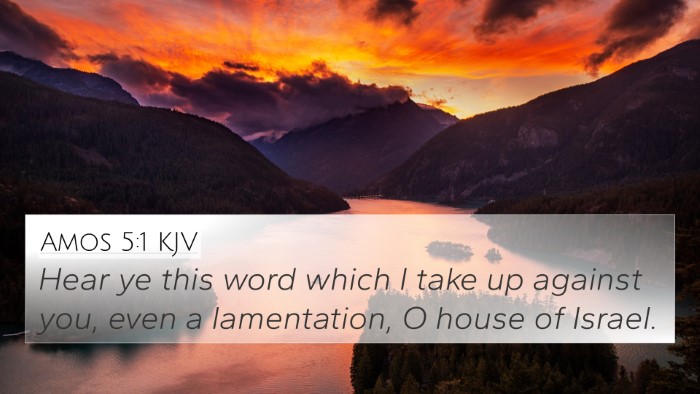
Amos 5:1 (KJV) »
Hear ye this word which I take up against you, even a lamentation, O house of Israel.
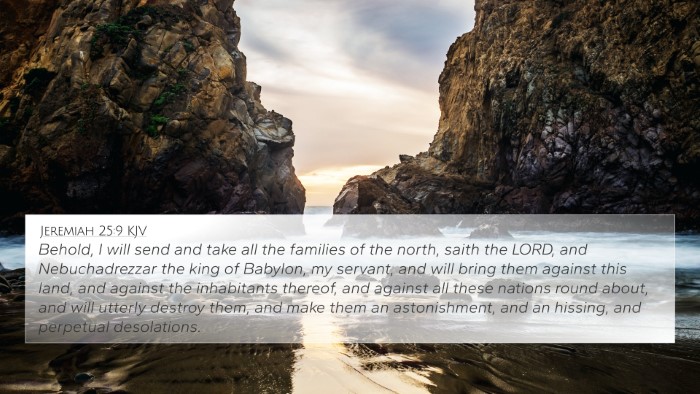
Jeremiah 25:9 (KJV) »
Behold, I will send and take all the families of the north, saith the LORD, and Nebuchadrezzar the king of Babylon, my servant, and will bring them against this land, and against the inhabitants thereof, and against all these nations round about, and will utterly destroy them, and make them an astonishment, and an hissing, and perpetual desolations.

Numbers 24:3 (KJV) »
And he took up his parable, and said, Balaam the son of Beor hath said, and the man whose eyes are open hath said:
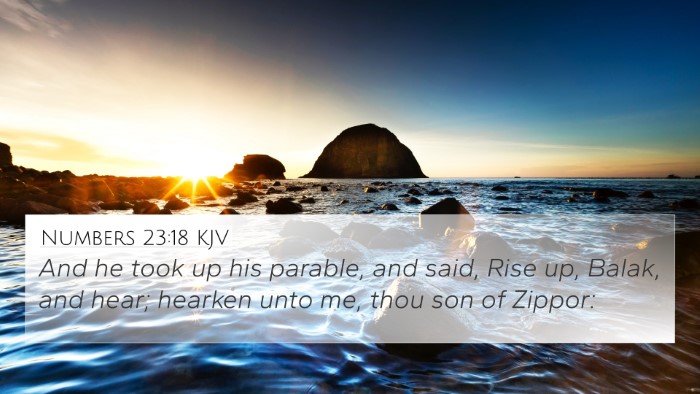
Numbers 23:18 (KJV) »
And he took up his parable, and said, Rise up, Balak, and hear; hearken unto me, thou son of Zippor:
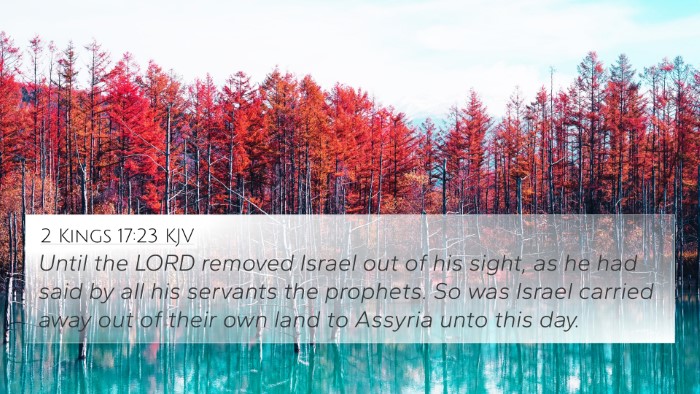
2 Kings 17:23 (KJV) »
Until the LORD removed Israel out of his sight, as he had said by all his servants the prophets. So was Israel carried away out of their own land to Assyria unto this day.
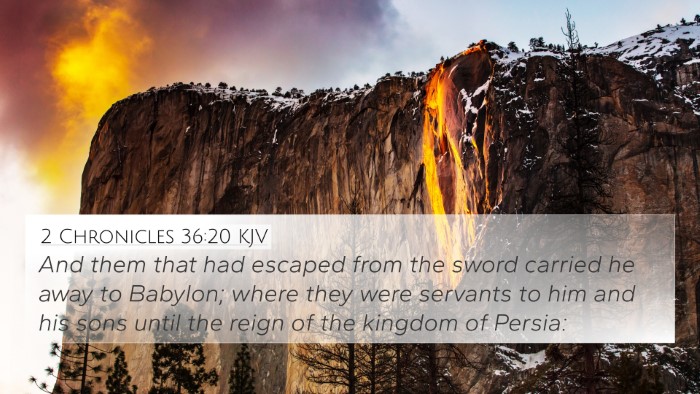
2 Chronicles 36:20 (KJV) »
And them that had escaped from the sword carried he away to Babylon; where they were servants to him and his sons until the reign of the kingdom of Persia:
Micah 2:4 Verse Analysis and Similar Verses
Understanding Micah 2:4
Verse Text: "In that day shall one take up a parable against you, and lament with a doleful lamentation, and say, We be utterly spoiled: he hath changed the portion of my people: how hath he removed it from me! turning away he hath divided our fields."
Summary of Biblical Meaning
The verse Micah 2:4 is a lament spoken in the context of impending judgment, emphasizing the consequences of the sins of Israel, particularly their injustices and oppression of the poor. This lamentation indicates the deep sorrow that will arise when the fortunes of the oppressors turn against them, serving as a warning and reminder of God's justice.
Insights from Public Domain Commentaries
- Matthew Henry: Henry emphasizes the theme of divine retribution. He interprets the verse as a prophetic warning where the people will realize the justice of God as their misdeeds lead to their own ruin. The lament indicates the anguish experienced when loss strikes those who wronged others.
- Albert Barnes: Barnes points out that the ‘day’ mentioned indicates a time of reckoning. He notes that the parable captures the essence of Israel's despair as they face consequences for ripping others off. This verse illustrates a shift from pride to shame as the oppressors lament their fate.
- Adam Clarke: Clarke highlights the social justice angle, dissecting how the loss of fields symbolizes a greater loss of livelihood for Israel. He notes that the lamentation reflects the collective grief over the destruction of their temporal and spiritual inheritance as judged by God.
Bible Cross References
- Jeremiah 5:26-29: Reflects Israel's injustices and God's anger towards them.
- Amos 8:4-6: Highlights the exploitation of the poor by the wealthy, paralleling the themes in Micah.
- Isaiah 10:1-2: Condemns those who create unjust laws and oppress the needy.
- Micah 6:16: Addresses the unfaithfulness of Israel, tying into the prophetic message of judgment.
- Proverbs 22:22-23: Warns against robbing the poor, reinforcing the justice theme found in Micah.
- Zephaniah 1:8-9: Discusses the judgment on those who dress in foreign attire, indicating moral decay.
- Ezekiel 18:30: Calls Israel to repentance, reflecting the need for justice and righteousness.
- Lamentations 3:34-36: Details injustice and the consequences, echoing Micah's lamenting context.
- Matthew 7:2: Connects the principle of judgment reflecting the measures one uses against others.
- Luke 16:19-31: The parable of the rich man and Lazarus highlights how the oppressed mourn their plight due to their previous indifference.
Connections Between Bible Verses
The verse Micah 2:4 serves as an integral part of the narrative of Israel’s prophetic messages, with strong connections to both the Old and New Testament teachings. This engages readers in a broader thematic understanding of God's justice and the moral implications of human actions.
Thematic Bible Verse Connections
The key themes present in Micah 2:4 are:
- Divine Justice: The inevitability of God's judgment on those who exploit and oppress.
- Social Responsibility: An emphasis on caring for the marginalized and addressing systemic injustice.
- The Consequences of Sin: How wrongdoings lead to a loss that is lamented and felt broadly within the community.
- Hope and Redemption: Even amidst lament, the conversation of restoration and future hope is subtly present.
Scriptural Cross-Referencing
Engaging in cross-referencing of biblical texts allows for a deeper understanding of God’s unchanging nature regarding justice. Here are some tools and methods to assist in this study:
- Bible Concordance: A comprehensive way to find related verses.
- Bible Cross-Reference Guide: Essential for systematic study.
- Bible Reference Resources: Important for theological studies, sermon preparations, and personal growth.
- Cross-Referencing Bible Study Methods: Approaches that enhance understanding through thematic connections.
User Intent Keywords
For those looking to explore various connections, consider questions such as:
- What verses are related to Micah 2:4?
- Find cross-references for Micah 2:4 to deepen understanding.
- How do Micah 2:4 and Amos 8:4 compare in their messages about justice?
Conclusion
Micah 2:4 serves as a vital reminder of the importance of justice and the heavy consequences that await those who disregard it. As we study this verse through various connections and methodologies, the broader implications of social justice and divine judgment come into sharp focus, providing necessary lessons for both personal introspection and communal ethics.
